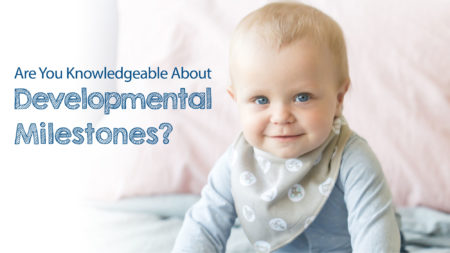Are you knowledgeable about developmental milestones?

One of the most common phrases you might see in a nanny job description is some version of “Nanny will engage the children in age-appropriate activities that will encourage growth and development.” We want to be sure you have this knowledge in order to meet the expectations of families, and even go beyond by wowing them with your expertise and resources.
Below is a list of some basic information for ages 0-1, but we encourage you to be proficient in all of the ages of the children in your care.
- 1 month: Newborns need around the clock feedings, have their head supported, sleep on their back, kept warm or cool (depending on your climate), to hear your loving voice and affection, and singing or reading to them is a bonus.
- 3 months: Infants are alert for 15 minutes or longer at a time, need to sleep, be fed, and cuddled. They love when you talk, sing (lullabies are the best), and read to them. They enjoy being given things to pull and teethe on, their hands and feet fascinate them, they will laugh and coo, and they enjoy fresh air. Now is a great time to start taking a stroll outside! Just make sure baby is dressed appropriately for a stroller ride.
- 5 months: Babies may be able to roll over and sit with support, hold their own toys, and often babble and are alert for two hours at a time. They can eat most baby food, enjoy happy sounds, like to be near you, and are learning to crawl. Some activities that help them develop include putting toys just out of their reach, dancing with them, tickling them, and telling them about the world.
- 9 months: This is the age where exploration really begins, and babies stay busy! They crawl, sit, pull on furniture, grasp objects, understand simple commands, and enjoy spending time with other babies (including reacting to their happiness and sadness). Dangerous items need to be put away, and educational toys keep them busy.
- 12 months: Babies at one year old may be able to pull themselves up, sidestep around furniture, and even begin walking. They are making lots of sounds and say “Mama” and “Dada.” They are curious, messy, want to touch everything, and love the outdoors – this is how they are learning! They like to play near others close to their age but they don’t always play with them. They need lots of cuddling, encouragement, singing, reading, and a safe environment for exploring.
Want to Dig Deeper?
The list above was summarized from an excellent resource we recently came across that describes the list of developmental stages and activities through age 14. We also found a week by week calendar to be aware of the milestones and activities that we thought you would find extremely handy! Lastly, we spotted a checklist and milestone tracker app to share.
A simple Google search can yield a number of resources for the age of children in your care, and whether you are interviewing, or you have been working with a family for many years, we encourage you to go above and beyond by planning, tracking and communicating this knowledge with family employers.
